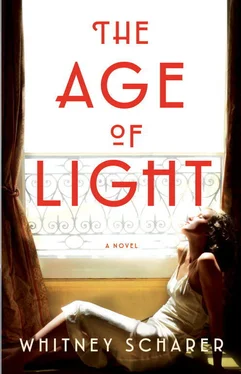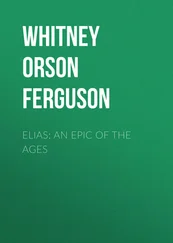Poppy turns to Lee as if they are in the middle of a conversation, which maybe they are—Lee cannot recall. “A few weeks ago Caresse and Harry had us drive out to Ermenonville. They own a mill there, and we met in the field behind it. I got into Harry’s car and Caresse got into Jimmy’s car. Lavender leather seats, custom work. At first it was the wildest thing. One switch and you’re leading a gorgeous new life. Harry gave me his gardenia—”
Jimmy reaches over and grabs Poppy’s face roughly, pushing her cheeks together so that her mouth distorts into an unattractive pucker. He lets go after a moment and she takes a sip of her drink as if nothing has happened. She is quiet for the rest of the ride. Antonio pays no attention to them, and when Lee glances at him he is cleaning his fingernails with a penknife. Usually this would disgust her. He has huge hands, long tapered fingers. Artist hands, Lee thinks. The knife blade reflects the light of the streetlamps as they drive, and Lee watches him for a while, then looks out at the city, watery and indistinct through her own reflection in the cab’s fogged windows.
Drosso’s turns out to be an apartment on the third floor of an unremarkable building in Montmartre. The exterior gives no hint of the opulent world they find inside, rooms opening one into the next like brilliantly lit jewels, furnished with silk settees and Persian rugs and piles of embroidered satin cushions. Drosso himself greets them, arms outstretched, dressed in the strangest and most fantastic coat Lee has ever seen, a long burgundy jacket with attached silk butterfly wings that flutter behind him as he approaches. He kisses everyone on both cheeks, awkwardly long kisses.
“Magnifique,” he whispers, and holds Lee at arm’s length and makes her twirl for him, ducking her under his wing and letting it brush over her like a curtain. When she has finished twirling, Drosso smiles and puts one arm around her and the other arm around Poppy and shows them to a dressing room, steps outside, and closes the door. A dozen brightly colored silk robes hang from hooks on the wall. Poppy begins disrobing immediately, piling her clothes haphazardly in the corner. At first Lee tries to watch her without looking as though she is watching her, but it doesn’t matter: Poppy is uninhibited, shimmying her way out of her garter belt and stockings the same way she must when she is alone.
When she sees Lee watching her, she says, “Everyone changes at Drosso’s,” as if that explains things. After debating it for a few more moments, Lee follows her lead. She fusses over the buttons of her dress, folds the garment extra neatly before setting it on the floor, and after she sees Poppy remove her brassiere she does the same, feeling as though she is back in the dressing room at a modeling studio. Once Lee is undressed, she chooses a sky-blue kimono and ties the belt tight at her waist, the silk cool and almost wet against her skin. She cannot bear to leave her camera—what if it gets stolen?—so she picks it up and tries to ignore how absurd she feels carrying it while wearing the robe.
As they emerge from the dressing room, Lee hears muted voices and low music coming from down the hall. Drosso is waiting. He leads them to the back of the apartment, to a library with gilded bookshelves, and then walks over to the shelves and pulls a lever. The bookshelf swivels open to reveal another huge room, this one painted deep eggplant, with several dozen people inside, most dressed in robes, reclining on sofas and the floor. In the center of the room is a low brass table with a hookah and a few opium pipes on it. A dark-skinned man sits cross-legged next to it, dressed in a brocade military jacket and a small close-fitting hat. He leaps to his feet as they come into the room and bows deeply. In a corner, a couple lies entwined, sharing sips from the valve of a hookah tube that snakes toward them from the table. The man’s hand rests in the woman’s hair, unmoving, and her eyes are closed. As Lee watches, the woman’s head starts to droop forward, and his hand clenches shut in her hair and holds her steady. The woman opens her eyes and smiles sleepily at him.
It is as if they have stepped out of Paris and into a Bedouin camp, the room a tent whose curtained walls muffle sound and throw great distorted shadows when people move around the space. A Moroccan screen in a corner half hides a kissing couple. One man lies facedown near the center of the room, so completely still Lee wonders if anyone is worried that he might be dead.
Lee does not know what to make of this place, these people, the thick smoke that hangs low in the room and curls around her ankles like a silent gray cat. Everything is disorienting: the smell, cinnamon and something harsher, a scent like unwashed bodies that makes her surreptitiously sniff her own damp armpits to make sure it isn’t her; the crouching man near the hookah, who has been staring at her since she came in and holds up one of the hoses each time she makes eye contact with him; the musician playing in the corner, a sort of low, droning cello that gives everything a nihilistic quality.
No one is paying attention to her, but Lee cannot stop thinking about herself: the way she’s cinched her kimono, the cumbersome camera case still clutched in her hand as if she is some kind of gawking tourist on Indian holiday.
She is drunk, but not drunk enough to consider smoking opium. That was her mother’s pastime—morphine, actually, the little blue vials lined up on the window ledge in her dressing room and glowing like sapphires in the sun. Lee looks around the room and sees her mother in all the drowsing women. “Go ’way, Li-Li. I’m tired.” There were times when her mother locked herself in her bedroom and ignored Lee for days at a time, emerging puffy and haughty, her eyes smeared with the remains of her makeup.
Lee has been high just once: she and her best friend, Tanja, tried laudanum together, and sometimes when she is sick she can still taste it at the back of her throat, cloves and bitter herbs and alcohol, the numbness of her tongue and the floating giddiness that came after it. She hated it, had panicked, as if her life were a balloon and she had just let go of the string.
Now she is trapped. Thinking of Tanja has made her miss her friend, and she wishes there were someone here who knows her. The bookshelf is closed behind her. Poppy has reunited with Jimmy, and Lee sees them embracing in a far corner. Drosso kneels next to a young man and helps him steady a needle into his arm. Only Antonio remains nearby, so Lee turns to him and he catches her eye and gestures to a bar cart she hasn’t noticed yet. She nods, grateful, and lets him fix her a glass. The truth is that she probably shouldn’t have more—she lost track of how much wine she had at the restaurant—but along with her nervousness she is filled with a reckless feeling.
Antonio brings her brandy, a man’s drink, and the bitter liquid cuts through the fug and instantly makes her feel better.
“You ever been here?” he asks her, his voice low. He was so silent at the restaurant it is a surprise to hear him ask a question.
Lee shakes her head. “I’ve only lived in Paris for a few months.”
“It’s not all just this.” Antonio gestures around them. “Drosso is an art collector. He’s very wealthy.”
“What does he collect?”
“Everything, I guess, though he loves modern work. He funds Littérature . That’s why we’re all here so often, suckling at the teat of our potential patron.” He nods his head toward a few men arranged around a hookah.
“All who?” Lee takes another swallow of the brandy, which is opening up her chest in a strange way, pulling like a hot knife through her breastbone.
“Éluard, Tzara, Duchamp. All the Surrealists. Here to channel the unconscious.” Antonio makes quotation marks in the air and smirks conspiratorially.
Читать дальше












